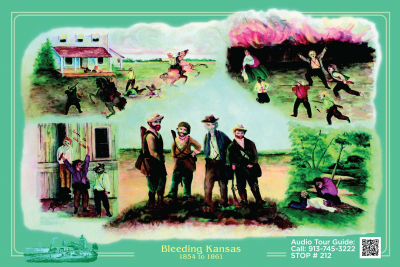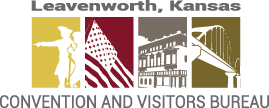Wayside Tour #12: Bleeding Kansas
Historic Wayside Tour #12 - Bleeding Kansas - 1854 to 1861
"Each man carried a bowie-knife, a revolver, a pair of breeches, a shirt and a very don't-care a damn expression...The stews and brothels, the hospitals and poorhouses of the East can furnish thousands more of just such scabby, scurvy, scapegoats, who will rejoice in a fancy jaunt to Kansas. We are in favor of Kansas becoming a Free State, we hope it will. But if freedom has so far fallen from her high estate that she has to use such men, such means, and such measures as are now being employed...then indeed, have the American people mistaken the character of their patron saint...We believe that the very worst type of men from the north are in Kansas, and that they have the pleasure of meeting there the very worst rowdies of the south. The two armies in Kansas are composed of the dregs of the respective parties..." stated a Nebraska journalist after observing Yankee Guerillas on their way to Kansas.
Proslavery English settler, R. H. Williams stated, "The Southerners, then, whether they had law and right on their side or not, were determined to establish 'squatter sovereignty' in Kansas and to carry the vote for slavery. The Northerners were determined that they should not succeed...The Government at Washington, controlled by the Southern Democrats, preserved a benevolent neutrality for the Southerners' cause, and did not interfere until compelled to do so by the frightful state of anarchy which eventually prevailed."
Elections were held to elect a territorial legislature. "...In many places the Missourians and other Southerners seized the polls and crammed the ballot boxes. In others, the "Free Soldiers" did the same. The result was that two legislatures were elected: the pro-slavery one making its capital at Lecompton, and the Free State, making one at Topeka...The rival parties met at the polls and elsewhere, and many lives were lost in the fights that took place...And all the many lives that were lost in this miserable border fighting, were lost in small affairs between scouting parties and outposts."
Individual accounts of violence include the fatal shooting of proslavery orator, Malcolm Clarke, at a public meeting in Leavenworth on April 30, 1855, by free soiler, Cole McCrea. McCrea was indicted but never prosecuted for the murder. Another incident and one of the most outrageous and disgraceful happened to William Phillips. It was believed Phillips had given McCrea the weapon to kill Clarke. On May 17th, Phillips was arrested and told to leave the territory or he would be tarred and feathered. When Phillips did not leave he was abducted and taken to Weston, Missouri. He was stripped to the waist, tarred and feathered and ridden on a rail. Phillips was then marched through town and placed on block to be auctioned off by a slave in a mock slave sale. "How much gentlemen, for a full-blooded abolitionist, dyed in de wool, tar, feathered and all?" (the slave shouted). The high bid was only one cent.
On August 28th, Phillips fared even worse when armed proslavery "regulators" came to call. "Phillips, supposing he was to be driven out of house and home, resolved not to submit to the indignity, and bravely took the initiative himself. Standing boldly upon the veranda of his house, when the ruffians drew up in front of it, he fired upon them, killing two of their number. They instantly directed a volley of bullets at him and the house, and Phillips fell pierced in a dozen places."
Larger-scale incidents included the "Sack of Lawrence" on May 21, 1856. Senator Atchinson, leader of the Border Ruffians, called to his men as follows..."Your duty, I know you will do; and if a man or woman dare to stand before you, blow them to hell with a chunk of cold lead".
In retaliation, on May 24, 1856, John Brown, abolitionist radical, murdered 3 proslavery men and two boys in Pottawatomie Valley. Described "like some evil mist, Brown and his band dissolved with the dawn, leaving in their wake shattered wives and children to stumble upon the corpses of fathers and sons".
"By this time the lawlessness and anarchy prevailing in Kansas had become a scandal to civilization, and great pressure was brought to bear on the government at Washington to put a stop to it. The president therefore ordered out two regiments of U.S. Cavalry...and issued a proclamation directing both parties to disperse; the troops to march against either side that might disregard it. Thereupon, we were marched into Leavenworth and disbanded and the so called Kansas War officially came to an end."
Although a cork had been temporarily put in the bottle, the bitter gall of savage guerilla warfare was to resurface until the summer of 1865 when the last combatants holstered their arms and the Civil War ended.



